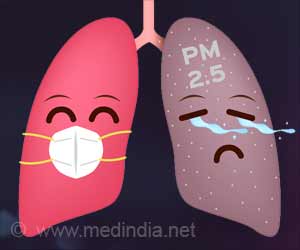
‘Short-term exposure to most types of air pollutants may increase the risk for NICU admission. ’
Tweet it Now
The study was led by Pauline Mendola, Ph.D., of the Epidemiology Branch at NIH's Eunice Kennedy Shriver National Institute of Child Health and Human Development. It appears in Annals of Epidemiology. Previous studies have linked elevated levels of certain kinds of air pollutants to higher risks for gestational diabetes and preeclampsia, a blood pressure disorder of pregnancy. Earlier research also has shown that infants born to women exposed to high levels of air pollutants are at risk for preterm birth, of being small for their gestational age at birth and of growing more slowly than normal in the uterus. Given these associations, the study authors sought to determine whether prenatal exposure to air pollution might increase the chance for NICU admission.
Researchers analyzed data from the Consortium on Safe Labor, which compiled information on more than 223,000 births at 12 clinical sites in the United States from 2002 to 2008. They linked records from more than 27,000 NICU admissions to data modified from the Community Multiscale Air Quality Modeling System, which estimates environmental pollution concentrations in the United States. Researchers matched air quality data in the area where each birth occurred to the week before delivery, the day before delivery and the day of delivery. They then compared these time intervals to air quality data two weeks before delivery and two weeks after delivery to identify risk of NICU admission associated with pollution levels.
The researchers also examined the odds of NICU admission associated with high concentrations of particulate matter (pollution particles) less than 2.5 microns in diameter (PM2.5). These types of particles originate from various sources, among them diesel and gasoline engines, power plants, landfills, sewage facilities and industrial processes. Exposure to high concentrations of organic compounds in the air was associated with a 147% increase in risk of NICU admission. Elemental carbon and ammonium ions presented similar increases in risk (38% and 39%, respectively), while exposure to nitrate compounds was associated with a 16% higher risk of NICU admission.
Chances of NICU admission increased significantly with exposures to traffic-related pollutants on the day before and the day of delivery, compared to the week before delivery: 4% and 3%, respectively, for an approximately 300 parts per million (ppm) increase in carbon monoxide; 13% and 9% for an approximately 26 ppm increase in nitrogen dioxide; and 6% and 3% an approximately 3 ppm increase in sulfur dioxide.
Advertisement
The authors note that rising NICU admission rates present financial challenges for families and society, as average daily NICU costs may reach or exceed $3,000. If their results are confirmed by other studies, limiting pregnant women's exposure to high levels of air pollutants may provide a way to reduce NICU admissions.
Advertisement










